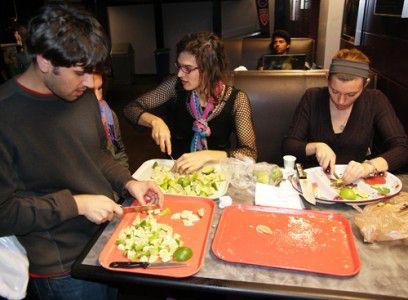
Students tested their taste buds against everything from cream cheese to vinegar at the Mind and Brain Society’s third annual Miracle Berry Tastravaganza on Wednesday from 7 p.m. to 10 p.m. in BU Central.
The miracle berry, originating in Africa, contains miraculin, a protein that binds to sweet-taste receptors and temporarily alters them to perceive sour foods as sweet, MBS members said. Lasting anywhere from 15 minutes to two hours, the effects vary from one person to another. In general, higher acid content in the berry leads to a higher effect.
Students who attended the tasting received a miracle berry and followed instructions on how to break it open. They were told to hold the berry in their mouths for as long as possible, as the effect is amplified the longer it touches their tongues. MBS members offered samples from a menu of lemons, limes, sour cream, apple vinegar, hot sauce, sour patch kids, cream cheese, wasabi peas and salt and vinegar potato chips.
“I tried the lemon. It was very sweet,” said School of Management sophomore Hana Vackova. “The lime was kind of bitter. And I tried the vinegar . . . that was really gross.”
When Vackova tried wasabi peas and hot sauce, she said she found them to be “tolerable,” but that she could still detect their spiciness.
“I took a second one I liked it so much,” said Crystal Shah, a College of Arts and Sciences and School of Education sophomore.
MBS President Frank DeVita, a CAS senior, said that they handed out about 200 free tickets to students.
MBS member and CAS senior Greg Salimando said that the miracle berry has been suggested for use as a dietary supplement. However, he said that there are no practical medical applications yet. The chemistry of the miracle berry is still not entirely understood, DeVita said. There have been many suggested uses for it, he said, such as getting rid of the metallic taste cancer patients get from chemotherapy.
MBS, founded in 2008, hosts activities designed to educate students about topics in neuroscience, philosophy, psychology and other sciences, Vice President Monika Chitre, a CAS senior, said. They started hosting the Miracle Berry Tasting in fall of 2010 as a social event.
“We like to do this because anyone can come . . . You don’t have to be a science major,” Chitre said. “We can reach out to people who might have new ideas.”



















































































































